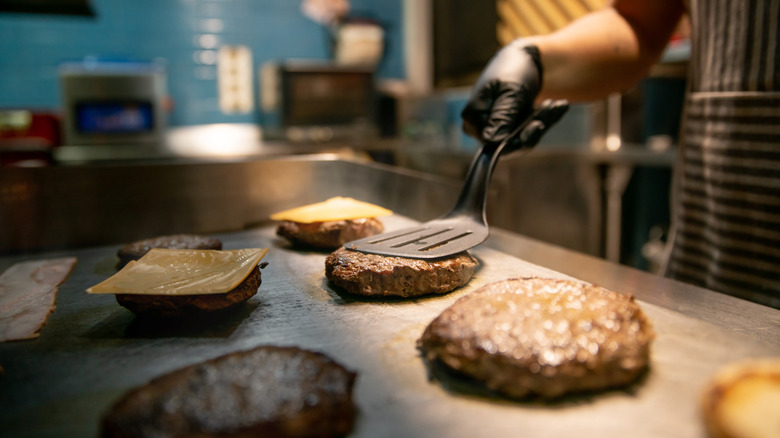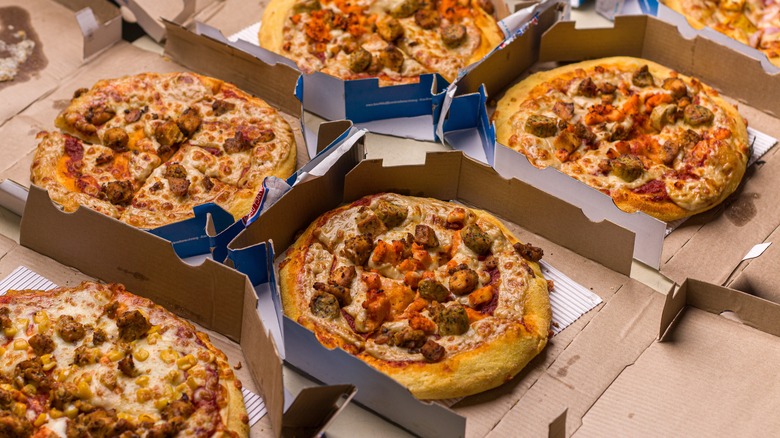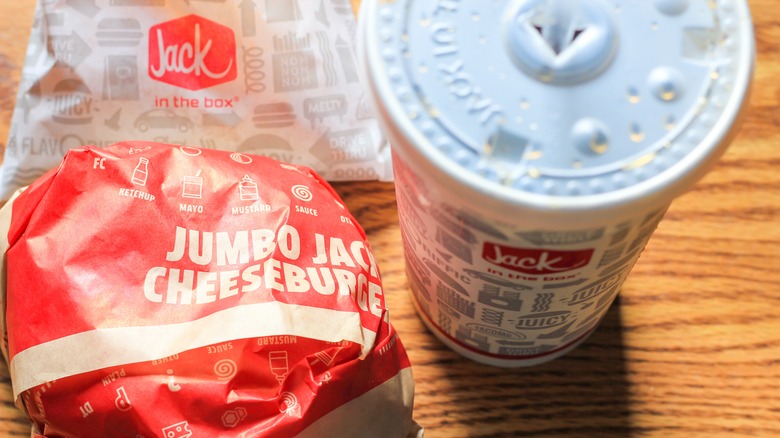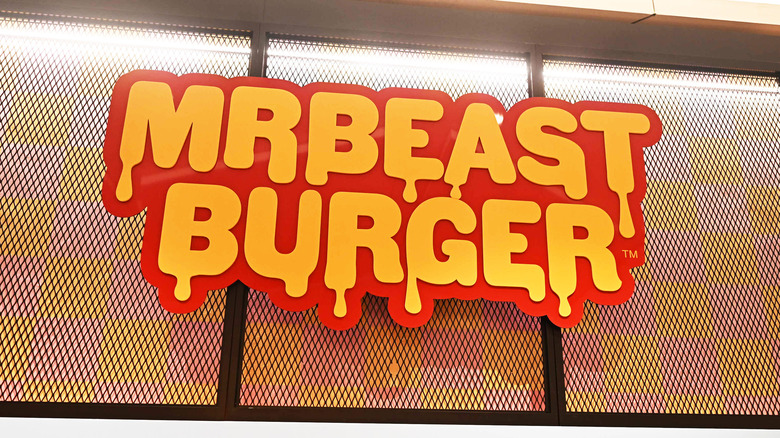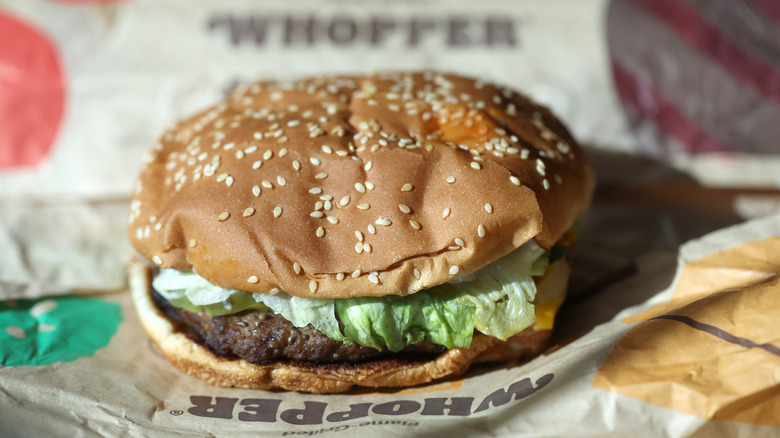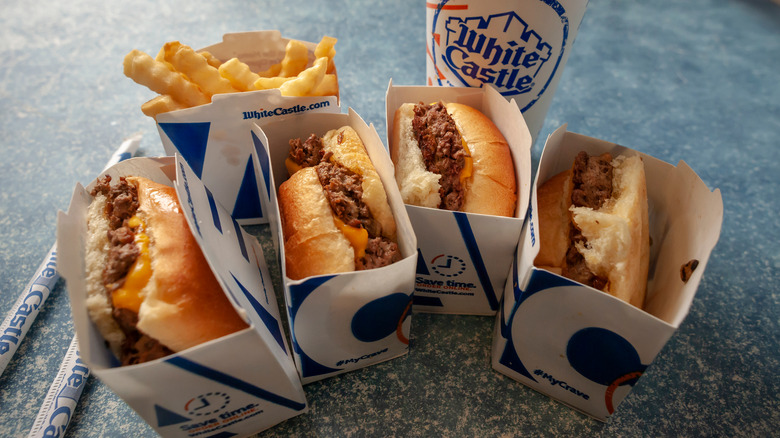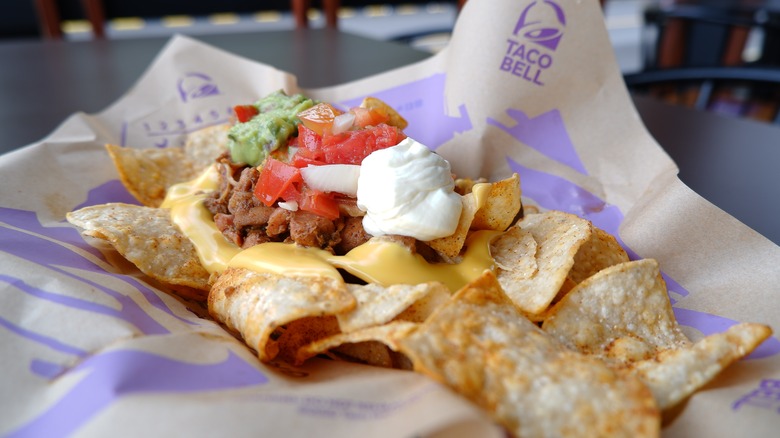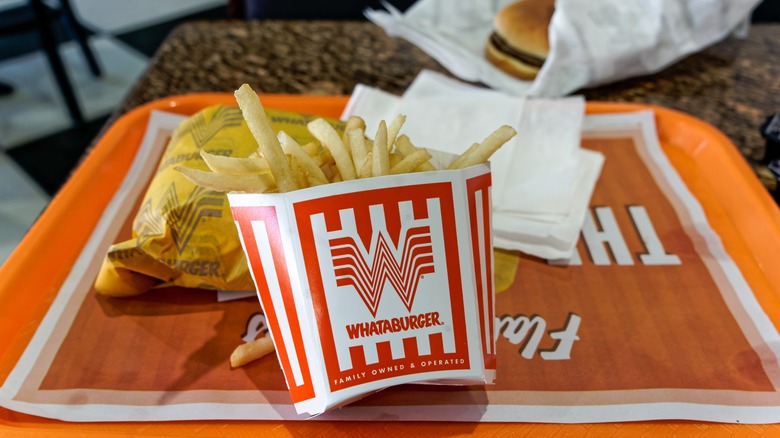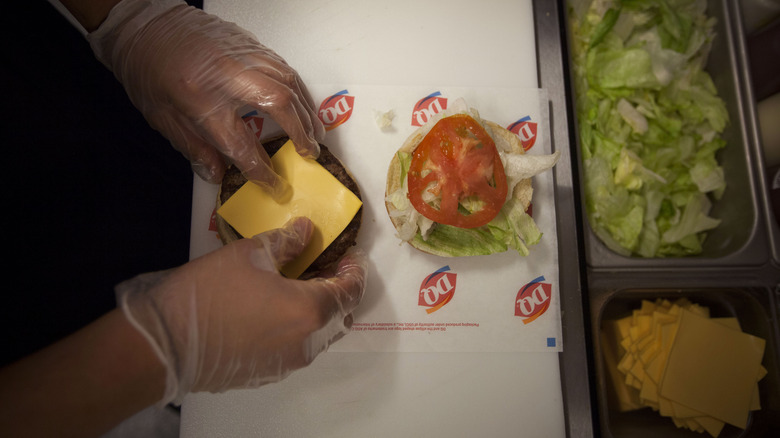Fast Food Restaurants That Serve Low-Quality Beef
Fast food beef is continually besieged by rumors of bad ingredients. Sometimes this reputation is undeserved, but it's all too common for a fast food company to use beef that's genuinely low in quality. Now, this doesn't necessarily mean that everything about the beef is terrible. Rather, let's say that there's something about it that makes it less than optimal. For many brands, that could be the use of antibiotics, given that most restaurants source meat from companies that treat herds with antibiotics, a practice that can increase the risk of generating antibiotic-resistant bacteria that can cause serious trouble for humans who encounter the germs.
There's more to the issue of underwhelming beef, of course. A company may use antibiotic-free beef, but that means nothing if the meat is mixed with so many fillers you begin to wonder if it still counts as beef. A 2008 study published in the Annals of Diagnostic Pathology found that the hamburgers from eight different fast food restaurants varied greatly in quality and content, with one containing only 2.1% actual meat. The rest of the material was gristle, bone, fat, and, in a couple of shocking cases, parasites (for better or for worse, the study didn't name names). If you're concerned about beef quality at the restaurants you like, look for sourcing information on their websites first. Then, take a look at our list of fast food restaurants that use low-quality beef to figure out where you may want to steer clear.
Domino's
No one orders from Domino's expecting gourmet pizza. After all, this is the place to go when you want cheap, fast pies, but surely you still want the ingredients in that pizza to be decent enough. However, Domino's hasn't received a lot of compliments when it comes to quality, especially in the past few years. Commenters on a 2022 Reddit thread discussed a perceived decline in quality in the chain, although one commenter noted that staff turnover leads to inexperienced workers trying to make your pizza. Another thread focuses on the beef toppings, with comments about the beef being "gross," "the worst," and "like 70 percent soy filler." Even Domino's itself has admitted the pizza isn't that good. In 2017, the company created an ad campaign meant to apologize for its reputation for terrible food.
But the chain's beef faces another quality issue: the use of antibiotics. Domino's no longer uses poultry from flocks treated with antibiotics, but its beef supplies are another matter. Domino's says that it intends to switch to beef from herds raised without antibiotics that are medically important to humans. However, that changeover doesn't seem to have happened yet. Even after the switch, the meat still won't be from completely antibiotic-free herds.
Jack in the Box
Jack in the Box has the unfortunate reputation of hosting one of the worst E. coli outbreaks ever in the history of fast food. That experience was instrumental in changing food safety standards, so you would hope that this extended to the overall quality of the chain's food. But take a look at the restaurant's ingredients, and you might not like what you find. The beef used in the beef tacos is actually a mixture of beef, chicken, textured vegetable protein, and defatted soy grits. In other words, that beef does not contain a lot of beef. However, Jack in the Box's beef hamburger patty consists of only beef.
Antibiotic-wary consumers may also want to steer clear of Jack in the Box. The company has an extensive animal welfare policy that addresses antibiotics in poultry (the company avoids flocks treated with medically important antibiotics but is not antibiotic-free). Yet, it does not say a thing about its stance on antibiotics in beef. It's probably safe to assume that, when you eat a beef product from Jack in the Box, you're eating beef from herds treated with antibiotics of some sort.
MrBeast
Popular YouTuber MrBeast partnered with Virtual Dining Concepts in 2020 to develop a MrBeast burger that would be made in ghost kitchens, where companies contract with existing restaurants or kitchen rental spaces to get their food made. MrBeast has one brick-and-mortar location in New Jersey but, in the rest of the country, ordering a MrBeast burger means you'll get something probably made in the kitchen of a local burger joint. Workers in this ghost kitchen will have made the burger according to a set of instructions provided by Virtual Dining Concepts.
Unfortunately, when you don't know exactly where the food is made, that also means you can't always control the quality of the ingredients, nor can you easily control the quality of how it's been prepared. To paraphrase the old saying, too many cooks seem to have spoiled the burger. Customers have complained about seemingly everything, from the taste of the burger to how they were put together, with one Redditor calling the burger "a waste of money" and saying that the meat seemed almost steamed. In 2023, MrBeast sued Virtual Dining Concepts to end their contract, citing customers who publicly called out the burgers.
Burger King
Flame-grilled fanatics may want to watch out for the antibiotic issue when it comes to beef sold at Burger King. That's because the company has no policy addressing the use of antibiotics in its food. Broadly speaking, beef that's sold in the U.S. is not supposed to have any antibiotic residue in it. In heartening news, that residue is rarely found in random testing. Still, if you want to be sure and definitely don't want to eat beef that may have encountered antibiotics somewhere along the line, then know that the beef products you buy at Burger King are not from antibiotic-free suppliers. Whether that will change in the future is unknown.
This is admittedly a lot better than what happened with Burger King in 2013. A meat supplier in Ireland was found to be distributing beef tainted with horsemeat, and Burger King found that some of the beef they had gotten did contain horse DNA. Horsemeat itself isn't dangerous, but the inclusion of undeclared ingredients implied that there could have been other issues that could have created a worse health problem.
White Castle
White Castle certainly holds a special place in many people's memories, which is kind of odd when you see how many fans also complain of gastrointestinal upset after eating a few of the chain's sliders. While White Castle details how it works with suppliers and its quality-control standards, others paint a rather ugly picture. Many agree that the chain's sliders are delicious but then talk about the digestive consequences at length.
What's behind these unfortunate and oftentimes rather disgusting reactions? The consensus appears to be the rather high amounts of grease, fat, and sodium that the small sliders contain. Some speculate that gut microbes may be reacting to the grease and digesting it inefficiently, leading to excessive gas. And of course, the small burgers are easy to eat, which might just lead some people to eat too many and place a strain on their digestive systems that could be too much to handle.
Taco Bell
If any fast food company has been through the rumor wringer, then it's got to be Taco Bell. From supposed use of Grade D meat (proven false) to assertions of mealworm-based fillers in its seasoned beef (also false), the company has had to battle all variety of ridiculous claims. Taco Bell was even once sued in an attempt to get it to divulge what it was really putting in its seasoned beef. That lawsuit was dropped and Taco Bell showed that its seasoned beef was pretty much beef plus flavorings, emulsifiers, and a few other food-safe additives.
However, that doesn't mean Taco Bell doesn't have its share of quality issues. Antibiotics are an issue, though one that's improving. While the company still uses beef from antibiotic-treated herds, it's started taking steps to reduce its use of beef from cattle that have been treated with medically important antibiotics. Another quality issue is meat texture. One Redditor complained about the steak used at Taco Bell, claiming that it "has the texture of a thick pile rug." Another commenter in the same thread noted that the meat can get gross very quickly if it's left to sit out after cooking. We think it's safe to say that neither of these seems like markers of high-quality meat.
Whataburger
Whataburger is another chain where the beef would be considered low-quality, at least so long as you're trying to avoid antibiotics. Whataburger was last seen on the Chain Reaction IV scorecard (a joint survey that ranks chains' use of meats from antibiotic-using sources) in 2018. There, it received a grade of F for not having any known antibiotics policy in place. Though it hasn't appeared on the latest Chain Reaction score, the company still doesn't seem to have a clear stance on antibiotics as of 2023.
Whataburger is often seen as a competitor to In-N-Out. Both are regional faves (traditionally, Whataburger in Texas and In-N-Out in California) that are constantly compared to each other and have very loyal fanbases. So, you'd think that this would mean that there wouldn't be any complaints about the quality of the beef at the Whataburger chain. However, many commenters have questioned what's going on with Whataburger beef patties and the company's food in general. This Reddit thread starts with a complaint that the beef was dry. Later commenters chime in to agree, stating that the patty seems to be thinner than it once was, while many state that quality overall has declined both due to the COVID-19 pandemic and to Whataburger's owners selling their majority stake in the company to an investment firm.
Dairy Queen
Yes, Dairy Queen is on this list partly because the popular fast food chain has no known antibiotic policy when it comes to how it sources its beef. Yet, it's also here because, well, people don't seem to like the chain's beef products very much at all. A common complaint is that the patties have an odd feel to them. For example, this Reddit thread has quite a few commenters complaining about the strange texture and gamey taste of burgers from DQ. Another thread also sees many people writing about a strange texture in all of the chain's burgers. That's a sign that the problem has more to do with the meat sent to all the restaurants and not the preparation or cooking in play at individual locations.
At least if you go to a Dairy Queen location in Texas, you will likely have the option of ordering tacos. Yet, that may not be the out you hope it will be. One cryptic comment on yet another Reddit thread warns readers not to eat the chain's taco meat. However, there's no follow-up, so it's up to you to decide if this is a genuine tip. It certainly seems like sticking to ordering DQ's famous Blizzards is the better way to go.
Arby's
Perhaps Arby's just wants to sell roast beef sandwiches, but instead finds itself the target of some pretty gross rumors. Possibly the weirdest is that the chain's roast beef is made out of some sort of gel, liquid, or even powder. Fact-checkers have debunked this notion pretty thoroughly and confirmed that you're getting actual meat. Yes, the meat is typically packaged in a viscous broth, but that's still not a fake meat component that somehow congeals to form the meat itself.
However, in a thread about things even fast food employees won't eat, this Redditor says that the chain's roast beef is really a bunch of beef scraps pressed into a block instead of an actual hunk of whole beef that's been roasted and then sliced. In Arby's defense, a reply further down in that thread noted that this is what a lot of deli meat is like, and other Redditors didn't seem all that concerned. Then again, Arby's received an F grade on the latest Chain Reaction survey for not having a clear and publicly-available policy about how it stands on antibiotics in beef.
Sonic
Sonic Drive-In faces the same two issues that so many other fast food restaurants seem to have when it comes to the quality of its beef. First, there's the prevalent issue with antibiotics. Sonic received an F on the Chain Reaction scorecard for having no clear policy regarding its use of antibiotic beef (though it does have one for poultry). If it seems like you're seeing antibiotics mentioned a lot, that's largely because so many companies simply haven't put a clear policy into place so consumers will know exactly what they're biting into.
The other problem: a perceived decline in quality that includes the burger meat. This Reddit thread dives into Sonic's plummeting food quality as of 2023, with some levying accusations that the chain's meat is simply gross and full of fillers. There has also been some speculation that a change in ownership of the company may have resulted in the worsening quality. Another commenter simply states the quality has declined over the past year, with no reasons given other than saying the poster believes the company changed the meat used.
Pizza Hut
As they say, once more, with feeling: as of 2023, Pizza Hut doesn't have a known public-facing policy about the use of antibiotics in its beef. Therefore, it got an F on the Chain Reaction survey. It does have a policy about avoiding antibiotics in its poultry supply, but the lack of action regarding the similar use of antibiotics in beef nevertheless places the company's beef products in the lower-quality category. Remember, after all, that you don't have to ingest the antibiotics yourself for them to promote the spread of antibiotic-resistant bacteria. It's the overuse of antibiotics overall that's the problem, and if companies continue to buy beef from suppliers that don't restrict antibiotics, it may well create the impression that there is no need for those suppliers to change.
Look through Pizza Hut's ingredient list, at least, and the beef products don't seem all that bad. But there are more additives here than you may want to dine on, such as silicon dioxide that's been added to the steak to prevent caking. And there have been complaints about the taste of the beef that are harder to ignore. Take the words of this Redditor, who claims to be a Pizza Hut employee. They said that they could barely eat a piece of the chain's beef when their manager asked them to test it, calling it nothing short of "absolute garbage."
